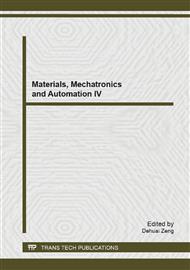[1]
Nemsick L W, Geraniotis E. Adaptive multichannel detection of frequency-hopping signals. Communications, IEEE Transactions on, Vol. 40(1992) No. 9, pp.1502-1511.
DOI: 10.1109/26.163571
Google Scholar
[2]
Fargues M P, Overdyk H F and Hippenstiel R. Wavelet-based detection of frequency hopping signals, Signals, Systems & Computers, 1997. Conference Record of the Thirty-First Asilomar Conference on. IEEE(Pacific Grove, CA, USA, 1997). Vol. 1, pp.515-519.
DOI: 10.1109/acssc.1997.680431
Google Scholar
[3]
Polydoros A, Woo K. LPI detection of frequency-hopping signals using autocorrelation techniques. Selected Areas in Communications, IEEE Journal on, Vol. 3(1985) No. 3, pp.714-726.
DOI: 10.1109/jsac.1985.1146255
Google Scholar
[4]
HFan, YGuoandYXu. A novel algorithm of blind detection of frequency hopping signal based on second-order cyclostationarity, Image and Signal Processing, 2008. CISP'08. Congress on. IEEE, (Sanya, China, 2008). Vol. 5, pp.399-402.
DOI: 10.1109/cisp.2008.266
Google Scholar
[5]
Candès E. Compressive sampling. Proceedings of the International Congress of Mathematicians, (Madrid, Spain, August 22-30, 2006). Vol. 3, pp.1433-1452.
DOI: 10.4171/022-3/69
Google Scholar
[6]
Candès E, Romberg J, and Tao T. Robust uncertainty principles: Exact signal reconstruction from highly incomplete frequency information. IEEE Transactions on Information Theory, Vol. 52(2006), No. 2, pp.489-509.
DOI: 10.1109/tit.2005.862083
Google Scholar
[7]
Candès E, Tao T. Near-optimal signal recovery from random projections: Universal encoding strategies ? . IEEE Transactions on Information Theory, Vol. 52(2006), No. 12, p: 5406-5425.
DOI: 10.1109/tit.2006.885507
Google Scholar
[8]
JWu, NLiu and YZhang, et al. Blind detection of frequency hopping signal based on compressive sensing, Consumer Electronics, Communications and Networks (CECNet), 2012 2nd International Conference on. IEEE, (Yichang, China, 2012) pp.1691-1694.
DOI: 10.1109/cecnet.2012.6201767
Google Scholar
[9]
JYuan, PTianandHYu. The detection of frequency hopping signal using compressive sensing, Information Engineering and Computer Science, 2009. ICIECS 2009. International Conference on. IEEE, (Wuhan, China, 2009) pp.1-4.
DOI: 10.1109/iciecs.2009.5365017
Google Scholar
[10]
Tropp J A, Gilbert A C. Signal recovery from random measurements via orthogonal matching pursuit. Information Theory, IEEE Transactions on, Vol. 53(2007), No. 12, pp.4655-4666.
DOI: 10.1109/tit.2007.909108
Google Scholar
[11]
Candes E J, Tao T. Decoding by linear programming. Information Theory, IEEE Transactions on, Vol. 51(2005), No. 12, pp.4203-4215.
DOI: 10.1109/tit.2005.858979
Google Scholar


